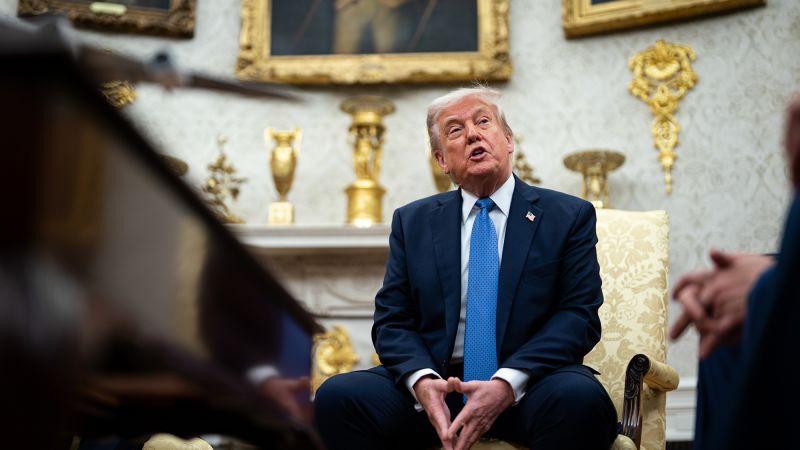A version of this story appeared in CNN Business’ Nightcap newsletter. To get it in your inbox, sign up for free here.
New York
CNN
—
Having mega-rich guys run the government invites all kinds of concerns about the potential for corruption, which is certainly a real (and well documented) concern surrounding the Trump administration, given the president’s crypto side hustles, a cabinet stacked with billionaires and the administration’s general lack of regard for the rule of law.
But beneath those lofty questions of ethics lies a more basic problem: These guys are out of touch. Especially with the voters who made clear their No. 1 concern was the cost of living in America.
The world got a peek inside the administration’s gilded bubble Wednesday, when President Donald Trump glibly brushed off concerns about his tariffs leading to bare store shelves and shortages: “Maybe the children will have two dolls instead of 30, you know?” he said at a Cabinet meeting. “And maybe the two dolls will cost a couple of bucks more than they would normally.”
That message of austerity is coming from a golf-club-and-casino mogul who is so obsessed with opulent decor that he reportedly has a “gold guy” slathering finishes on the fixtures and furnishings of the White House, all while spending taxpayer money on regular weekend trips to his private Floridian social club.
The doll comment was notable, too, because it was a rare acknowledgement of a reality the president has long denied: His tariff policies will create shortages and raise prices.
Children’s toys are particularly vulnerable, as nearly 80% of all toys sold in the US are manufactured in China, my colleague Elisabeth Buchwald reports. Most US toy sellers are grappling with two stark choices: raise retail prices to offset the 145% tax Trump is forcing them to pay on Chinese goods or stop importing and potentially go out of business.
And while Trump may think of children’s toys as frivolous expenditures that Americans can easily do without, he forgets that they’re actually important. We may be a materialistic, indulgent people, Mr. President, but we are also the engine of the world’s biggest economy.
Trump’s doll gaffe was hardly the first “let them eat cake” moment for the administration. In March, Treasury Secretary Scott Bessent (estimated net worth: $520 million) caught flak for his claim that “access to cheap goods is not the essence of the American Dream.”
Maybe not. But over the last 25 years, cheap stuff like toys, clothing, cars, TVs and smartphones and other everyday goods once seen as luxuries have become more affordable and more ubiquitous. At the same time, other essentials have become shockingly expensive. Housing, food, health care, college tuition have all have ballooned to record levels, and are now the source of the shared anxieties that define the American middle class. That dichotomy is illustrated in a widely circulated chart by economist Mark J. Perry.
Trouble is, the administration’s tariff agenda doesn’t do anything to bring down the costs of hospital visits, housing or higher education. If those things aren’t essential to the American Dream, I’m not sure what is.
In another telling moment this week, Commerce Secretary Howard Lutnick (estimated net worth: $1.9 billion) went on CNBC to pitch the White House’s vision of the “tradecraft” jobs of the future.
“This is the new model where you work in these kinds of plants for the rest of your life, and your kids work here, and your grandkids work here.”
The statement reflects a kind of romantic, 1950s notion of factory work that Trump (estimated net worth: $6.5 billion) frequently alludes to.
It is a fantasy. Some of the jobs Trump wants to “bring back” to the United States would likely be the kind of high-paid, highly automated roles that already exist in American manufacturing. But that’s hardly the reality of most factory work in the world. No one in the Trump administration is likely to push their own children to take up factory work — in fact, Lutnick recently handed the reins of his investment firm over to his 27- and 28-year-old sons, Brandon and Kyle.
But more to the point, most Americans simply don’t want that kind of work. According to a recent CNN poll, 73% of respondents would rather do office work than manufacturing.

